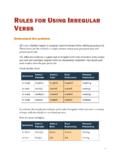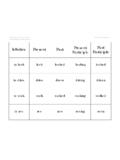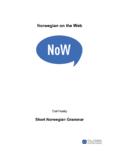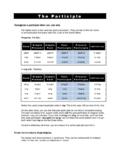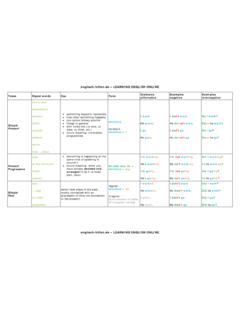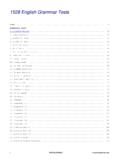Transcription of 2ESO Summer Work - Colegios El Valle
1 Language Department 2 ESO Summer work 2013. Name: _____. GRAMMAR. PRESENT SIMPLE AND CONTINUOUS. Present simple Present continuous We use the present continuous to talk about: We use the present simple to talk about: something that is happening now or regular habits and routines. around now'. We usually go rollerblading at the weekend. They're playing tennis at the moment. permanent situations. temporary situations. David lives in Manchester. He's visiting his grandparents in Ibiza. scientific facts. changing or developing situations. Water boils at 100 C. The number of car accidents every year states, not actions, like, believe, know. is increasing. She doesn't like chorizo. future arrangements. She's going to the cinema this evening. 1. Complete the sentences with the present simple or present continuous of the verbs in brackets. 1) Paul_____(not go) to the cinema very often.
2 2) He_____(play) tennis with his brother at the moment. 3) Paul_____ (never shut up) in class. 4) Paula_____(like) living in Madrid. She_____(enjoy) a lot her current life in the city. 5) She sometimes_____(go) for a walk after work . 6) John_____(meet) his friends this week-end in the pub. 7) It_____(not rain) very much in the south of Spain. 8) I_____(not believe) what you_____(tell) me right now. past SIMPLE AND CONTINUOUS. past simple past continuous We use the past continuous to talk about: an action which was in progress at a particular time in the past . We use the past simple to talk about a finished action They were watching TV at nine o'clock last night. in the past . an action in the past that is interrupted by another Mark went to the cinema last night. action I was walking along the street when someone stole my bag. the exercise with sentences in past continuous and the verbs in brackets.
3 1) We_____(play) tennis all day. We are so tired! 2) I_____(come) back home when I ran into my best friend Richard. 3) She_____(tell) stories to her little brother until he fell asleep. 4) The two brothers_____(argue) all day. I couldn't stand so much noise! 5) What_____(you do) yesterday while I was studying? 6) _____really_____(she study) yesterday as she said? 2. Complete the sentences using the correct verb forms. Use the past simple and the past continuous. 1) When I_____(arrive) home, my father_____(watch) TV. 2) I_____(have) a shower when the phone_____(ring). 3) My brother_____( work ) on the computer when the light_____(go). off. 4) We_____(watch) TV at night when I_____(hear) a frightening noise. 5) Paul_____(eat) all his food and _____(drink) all his coke while he_____(wait) for the train. 6) She_____(ride) her bike when she_____(fall) to the floor. 3. Complete the dialogue using the past simple or the past continuous of the verb in brackets.
4 -Sarah: Hi, Bryan. I (1)_____ (hear) you had an accident last Monday. What (2) _____. (happen)? -Bryan: I (3)_____ (change) a bulb when I (4)_____ (fall) off the chair -Sarah: (5)_____(go) to the doctor? -Bryan: Yes, but when he (6)_____ (examine) me he (7)_____ (receive) a phone call. Apparently his wife (8)_____ (have) an accident when she (9)_____(come) home -Sarah: Really? Is she ok? --Bryan: Yes, she (10)_____ (drive) a bit fast when she (11)_____ (crash). against a tree but she seems to be fine now. -Sarah: I'm happy to hear that. I (12)_____ (call) yesterday to know why you hadn't come to work . -Bryan: I know but I (13)_____(have) a shower when the phone (14)_____(ring) and I (15)_____ (not/ want) to have another accident!! -Sarah: Yes, you're right!!! VERBS + -ing 1. Complete the gaps in the sentences marked with (1) with one verb of the first box and the gaps with (2) with the correct form of the verbs in the second box.
5 Sometimes more than one option is possible. (1). like love enjoy not mind prefer can't stand hate be into (2). go watch do travel make study help swim 1 My brother (1)_____ (2)_____. He's been to the five continents. 2 I don't (1) _____(2)_____sport. I never play football or go to the gym. 3 I (1)_____ )2)_____ films at home but if I have to choose, I. (1)_____ (2)_____to the cinema 4 I (1)_____(2)_____ my bed but my mother always obliges me! 5 Paula (1)_____ (2)_____ Science. She gets sick only of thinking of the next exam. 6 I( 1)_____ (2)_____my mother at home. She works hard and she needs a rest. 7 Since I went to the swimming-pool for the first time I (1)_____. (2)_____. I really like it!. USED TO / DIDN'T USE(D) TO. We use used to + infinitive when we talk about a habit or state that now has changed. The negative form is didn't use(d) to and it implies a habit we didn't do in the past or something that didn't happen but we do or it happens now.
6 1. Fill in the blanks with the correct form of used to. 1 I_____eat vegetables when I was young but now I love them. 2 _____ (you / work ) as an accountant before you started here? 3 When we were children, we often _____ (go) trekking in the valley. 4 They_____(see) each other very often but now they haven't met for a long time. 5 I _____ (not / like) Sonia much, but now we get on really well. 6 I _____ (have) a lot of money before but I wasted it. SUBJECT/OBJECT QUESTIONS. **Subject questions structure: QW + VERB. Examples: --Who was playing tennis yesterday in --Which car runs faster? Mercedes or the school? Ford? --Paul and John were playing tennis --Mercedes runs faster than Ford yesterday in the school **Object questions structure: QW + AUXILIARY + SUBJECT + VERB. Examples: --How much did your new car cost? --Who did you see yesterday in the mall? --It cost me about 20,000.
7 --I saw my best friend Robert in the mall. 1. Complete the dialogue with the correct form of the verbs in brackets. --John: When_____(be) Marie's birthday? --Alice: It's today. _____(somebody buy) a present for her? --John: I think Paul and Michael went to the shop to buy a gift yesterday. --Alice: Really, What _____(they/get) for her? --John: I think they bought a sweater and a couple of t-shirts. --Alice: ok, out of curiosity, how much_____(the sweater cost)? Which colour_____(they choose)? --John: I don't know. By the way, how many people_____(she invite)? --Alice: I think all her classmates will come. I hope so, they're usually nice people. --John: really? Who_____(you meet) in her last birthday? 2. Give questions for the following answers. Examples: *I saw my friend Paul yesterday in the mall: Who did you see yesterday in the mall? * I saw my friend Paul yesterday in the mall: Who saw your friend Paul yesterday in the mall.
8 1) Mark's father often played in the street when he was young 2) Mark's father often played in the street when he was young 3) People listened to music on their walkmans in the 80s and 90s 4) People listened to music on their walkmans in the 80s and 90s 5) Now people usually talk on their cell phones because it is cheaper than before 6) Now people usually talk on their cell phones because it is cheaper than before 7) My grandparents bought the first TV at home in 1969. 8) My grandparents bought the first TV at home in 1969. past PERFECT/ past SIMPLE. * past Perfect formation: HAD + past PARTICIPLE (-ed for regular verbs or third column of the irregular verb list). *Use opposed to past simple: past perfect expresses an action that happened before another action in past . I had already read the book before I saw the film I had never had English classes before I started with my Irish teacher My parents had finished dinner when my sister came back home 1.
9 Complete the sentences with verbs below. Put the verbs into the past perfect. There are two verbs you do not need. watch remember forget wait be not pass lose run 1) I didn't go to the cinema with the others because I_____ the film before. 2) All the fans were disappointed because their team_____the match. 3) _____ever_____to France before you spent your holidays last year in Paris? 4) We were very tired at the end of the race because we_____for one hour. 5) My mother got very angry because I _____ my exams. 6) When I was in the street I realised that I _____ the keys at home. 2. Choose the correct alternative 1) I didn't go/hadn't watched the film last night because I already saw it/ had already watched it in the cinema. 2) I couldn't/hadn't been able to go out yesterday because I didn't finish/hadn't finished my housework. 3) When Paul arrived/had arrived at the airport the plane already took off/had already taken off.
10 4) Our best friend died/had died some days before so we were/had been all very sad those days. 5) I was never/had never been to the USA before I went/had gone there last year. 6) I didn't go/hadn't gone to the concert because I didn't buy/hadn't bought the tickets. 3. Complete the text using the past perfect or past simple of the verb in brackets. Yesterday I did not have a good day. At first I (1)_____ (get up) with plenty of energy but then things (2) _____(start) going wrong. I (3) _____ (run) out of hot water just precisely when I was having a shower, and it's winter! Then, I was driving to my office when a police car (4) _____ (stop) me. The policeman (5). _____ (tell) me I had to pay a fine because I (6) _____ (drive) too fast. He also (7) _____ (say) to me that my driving license (8) _____ (expire) some time before and I had to pay another fine. My problems anyway (9) _____.

